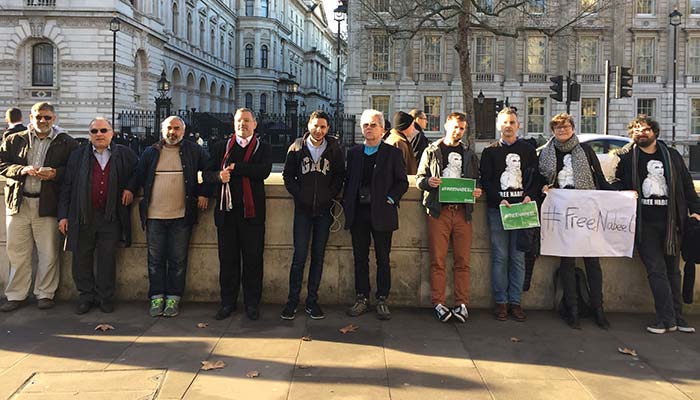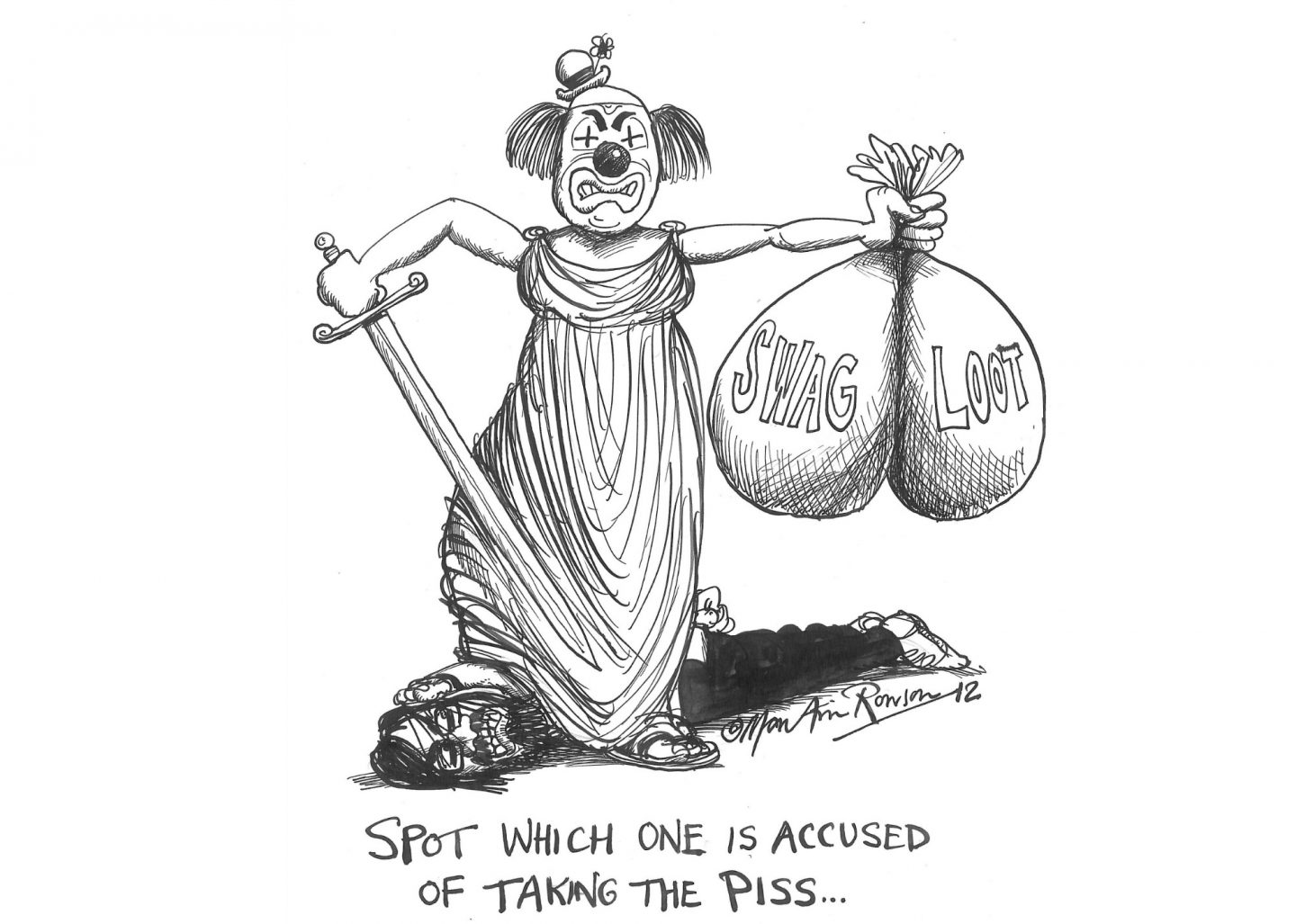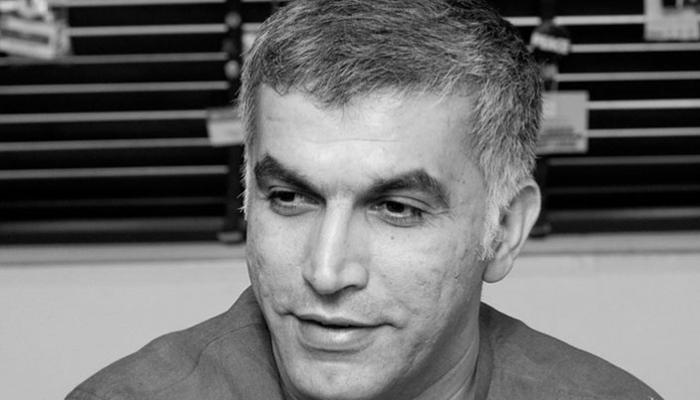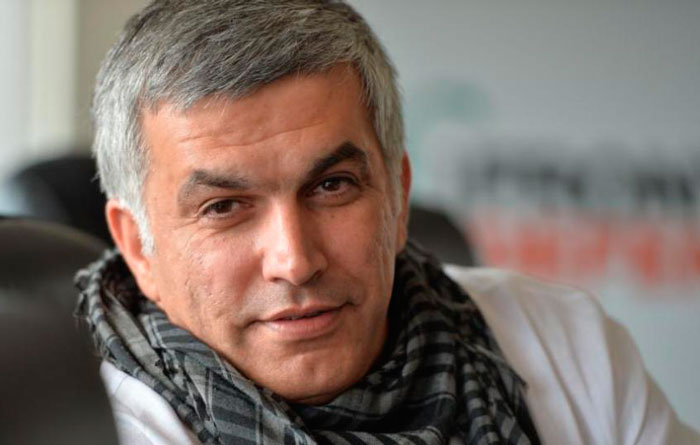Index relies entirely on the support of donors and readers to do its work.
Help us keep amplifying censored voices today.
[vc_row][vc_column][vc_column_text]

Protesters from Bahrain Institute for Rights and Democracy, Index on Censorship and English Pen called for Nabeel Rajab’s release outside 10 Downing Street.
Parliamentarians today joined in calling on the UK government to call for the release of jailed activist Nabeel Rajab.
Twenty-three Members of Parliament have penned a joint letter to the Foreign Secretary calling on the UK government to demand the “unconditional release” of Nabeel Rajab from prison, and for the charges against him to be dropped.
The letter signed by a cross-party group of MPs from the Conservatives, Labour, Scottish National Party, DUP, Liberal Democrats, Green and SDLP, urges the UK Government to follow the lead of the US State Department, the European Parliament, and the United Nations, in calling for Bahrain to release Mr Rajab.
The letter said: “We urge you, in advance of the trial tomorrow, to make it clear to Bahraini officials that the United Kingdom wishes to see his unconditional release from prison, and for the charges brought against him, which are related to his right to freedom of expression and freedom of speech, to be dropped.”
Margaret Ferrier, a Scottish MP who chairs Westminster’s All-Party Parliamentary Group on Democracy and Human Rights in the Gulf, commented:
“This is a matter of freedom of speech and expression. Nabeel Rajab is highly-regarded as a prominent human rights activist, and these charges are little more than an attempt by Bahraini authorities to silence a dissenting voice. I find it concerning that Mr Rajab is facing such a lengthy prison sentence, particularly given that his health has already begun to deteriorate as a result of the time he has spent behind bars already. The Foreign Office has given assurances that they have repeatedly raised Mr Rajab’s case with Bahraini officials, and whilst this is welcome, we are calling for it to go one step further and urge its key Gulf ally to release him unconditionally and to drop all charges.”
Their calls are echoed by Tom Brake, Foreign Affairs Spokesman for the Liberal Democrats. He said: “With Nabeel’s trial imminent, now is the right time for the UK government to call openly and loudly for his immediate release. Anything less will be spineless and destroy the UK Government’s credibility globally on human rights.”
Also today, rights groups including Index on Censorship and the Bahrain Institute for Rights and Democracy protested outside Downing Street and delivering a letter to the Prime Minister.
Theresa May was in Bahrain last week to set out her new “bold vision” for British-Gulf relations. Human rights was not mentioned in her speech to Gulf leaders, nor by Foreign Secretary Boris Johnson, who was also in Bahrain for a separate security conference.
The Bahrain Institute for Rights and Democracy and Index on Censorship, along with three NGOs also wrote a letter to the Prime Minister: “There is nothing bold in silence over clear human rights violations, and we urge you to now make a public call for Nabeel Rajab’s immediate and unconditional release.”
Sayed Ahmed Alwadaei, Director of Advocacy, Bahrain Institute for Rights and Democracy: “We have seen how Theresa May lashed Boris Johnsons over his comments on Saudi. Nabeel Rajab criticised Saudi Arabia and Bahrain over their bombardment in Yemen and is facing prison for it. If May or her government fail to publicly call for Nabeel’s Rajab release, Bahrain will take it as a green light for their repression.”
Nabeel Rajab is facing up to 15 years in prison on charges related to his Twitter activity. He faces an additional one year charge following a letter he wrote to the New York Times. He has been held in pre trial detention since June 2016. His next court date is tomorrow, 15 December.
[/vc_column_text][/vc_column][/vc_row][vc_row][vc_column][vc_basic_grid post_type=”post” max_items=”4″ element_width=”6″ grid_id=”vc_gid:1481725675581-b793a85f-0a91-5″ taxonomies=”3368″][/vc_column][/vc_row]
[vc_row][vc_column][vc_column_text] Indian human rights defender Aseem Trivedi has been arrested, imprisoned and shut out of mainstream Indian media for his powerful ‘Cartoons Against Corruption’ series. When Aseem was imprisoned in 2012, the Guardian’s celebrated political cartoonist Martin Rowson drew a cartoon condemning his arrest. Today, Aseem is a renowned advocate for detained human rights defenders around the world. He has drawn cartoons in solidarity with activists in Bahrain, Saudi Arabia, Kashmir, and more. Aseem will join Martin in London to discuss, draw and debate freedom of expression and solidarity across borders.
Indian human rights defender Aseem Trivedi has been arrested, imprisoned and shut out of mainstream Indian media for his powerful ‘Cartoons Against Corruption’ series. When Aseem was imprisoned in 2012, the Guardian’s celebrated political cartoonist Martin Rowson drew a cartoon condemning his arrest. Today, Aseem is a renowned advocate for detained human rights defenders around the world. He has drawn cartoons in solidarity with activists in Bahrain, Saudi Arabia, Kashmir, and more. Aseem will join Martin in London to discuss, draw and debate freedom of expression and solidarity across borders.
Martin Rowson is an award-winning cartoonist whose work has appeared in the Guardian, the Daily Mirror, The Times, New Statesman, the Spectator, the Morning Star, the Scotsman, the Irish Times, Index on Censorship, Time Out and many more. His books include graphic novelisations of T. S. Eliot’s The Waste Land, Laurence Sterne’s Tristram Shandy and Jonathan Swift’s Gulliver’s Travels. His collection of cartoons about the last government, The Coalition Book, won the Paddy Power Political Book Award for Political Humour & Satire. Martin is chairman of the British Cartoonists’ Association and in 2001 was appointed Cartoonist Laureate for London by Ken Livingstone.
Martin is on Twitter @MartinRowson.
Aseem Trivedi is an Indian cartoonist and human rights defender. He played a leading role in India’s 2010 anti-corruption movement with his ‘Cartoons Against Corruption’, leading to the government suspending his website, and charging him with sedition, breaching the IT Act, and ‘insulting’ national symbols. After three days in prison, Aseem launched a campaign against the legislation used to target him and other activists, and went on hunger strike demanding its repeal. In 2015, India’s Supreme Court struck down the legislation. Aseem has since created a comic magazine highlighting human rights defenders around the world. He still faces up to three years in prison for ‘insulting’ the government through his art.
Aseem is on Twitter @aseem_trivedi
Presented By: English PEN in partnership with Front Line Defenders, PEN International and Index on Censorship
[/vc_column_text][/vc_column][/vc_row][vc_row][vc_column][vc_column_text css=”.vc_custom_1478623253386{border-radius: 5px !important;}”]
[/vc_column_text][/vc_column][/vc_row]

The trial of prominent Bahraini human rights activist Nabeel Rajab – president of the Bahrain Centre for Human Rights – has been postponed for a fourth consecutive time to enable the country’s high criminal court to hire a cybercrime expert to verify who manages his Twitter account.
A new trial date has been set for 15 December.
“Nabeel Rajab’s continued detention is clearly aimed at silencing him and punishing him for expressing his views. The reopening of his case seems to confirm the political motives behind Rajab’s prosecution. He should be released immediately and all charges must be dropped,” Melody Patry, senior advocacy officer for Index on Censorship, said.
BCHR said in a statement that the latest postponement “throws a light on the lack of evidence of any wrongdoing” by Rajab.
It continued: “Rajab is being prosecuted in relation to tweets and retweets about torture in Jau Prison and the human rights violations in the war on Yemen. The prosecution of Rajab is based on Articles 133, 215, and 216 of Bahrain’s Penal Code over charges of ‘false or malicious news, statements, or rumours,’ ‘offending a foreign country’ (Saudi Arabia), and “offending a statutory body” – for which he may be sentenced to up to 15 years in prison.”
On 13 June 2016, Rajab was taken from his home. He was charged the next day and – on orders of the court – has remained in custody since while awaiting his trial, despite recurring health problems for which he was briefly hospitalised in late June after 15 days in solitary confinement.
His trial was initially due to take place on 2 August but was first delayed until 5 September, and then 6 October, 31 October and now 15 December.
Rajab served two years in jail between 2012 and 2014 for taking part in protests in the country.

A Bahraini high criminal court has postponed the sentencing of leading human rights defender Nabeel Rajab, who faces up to 15 years in prison for messages posted on Twitter.
Rajab, the president of the Bahrain Center for Human Rights, is on trial on multiple charges of “disseminating false rumors in time of war”, “insulting a neighboring country” and “insulting a statutory body” under articles 133, 215 and 216 of the penal code. The charges collectively carry up to 15 years in prison. These are in relation to remarks he tweeted and retweeted on Twitter in 2015 about the humanitarian crisis caused by the Saudi-led war in Yemen – with Saudi Arabia the “insulted” country – and documenting torture in Bahrain’s Jau prison.
In September, Bahrain’s prosecution brought new charges against him for “undermining the prestige of the state” after the New York Times published his opinion piece, Letter from a Bahraini Jail. This charge could carry an additional year.
Back in January 2014, when Stephen Colbert asked Human Rights Watch executive director Ken Roth who the next Nelson Mandela would be, Roth named Nabeel Rajab. This week, Human Rights Watch writes: “Is it right or trite to compare Rajab to Mandela? That’s a matter for debate, but it’s certainly reasonable to compare states’ deification of one activist with their silence over another, and Mandela – a vocal supporter of free expression – would surely have seen the double standard.”
HRW’s Roth hit out again on Twitter yesterday: “He’s Bahrain’s Nelson Mandela but the West doesn’t show anywhere near the same concern for his plight.”
Last month, 22 rights groups wrote to 50 countries urging them to call for Rajab’s release. All 50 states, including the UK, had previously raised concerns over Bahrain’s human rights situation. However, until now only the United States has called for Nabeel Rajab’s release. The EU’s Special Representative for Human Rights Stavros Lambrinidis said yesterday on Twitter: “In Bahrain, the EU closely follows tomorrow Nabeel Rajab’s trial. Hope for his release from jail and commencement of national reconciliation efforts.”
Husain Abdulla, Executive Director, Americans for Democracy & Human Rights in Bahrain: “When countries go silent on Nabeel Rajab’s imprisonment because of the Gulf’s strategic importance, that is short-sighted and shameful. The US has talked a good talk on Nabeel: now let’s see them act on it.”
The UK has made no clear statement on Nabeel Rajab, apart from expressing “concern”. In November, Prince Charles will be visiting Bahrain, as well as Oman and the United Arab Emirates, to improve bilateral relations.
Sayed Ahmed Alwadaei, Director of Advocacy, Bahrain Institute for Rights and Democracy: “British silence will consign Rajab to this fate. The UK could have intervened, criticised the situation or called for an end to this flagrantly unfair trial on countless occasions, and so far they have failed to step up every single time. This act of repression is not just the fault of Bahrain, but the fault of every ally which enables Bahrain to continue in this way.”
In September, the UN High Commissioner for Human Rights used his opening statement at the 33rd session of the Human Rights Council (HRC) to warn Bahrain: “The past decade has demonstrated repeatedly and with punishing clarity exactly how disastrous the outcomes can be when a Government attempts to smash the voices of its people, instead of serving them.” Today’s sentencing is yet another case of the Bahraini government attempting to smash those voices.
Rajab has been held in pre-trial detention since his 13 June 2016 arrest, which coincided with the opening of the June session of the HRC. He was initially held in East Riffa, where police kept him in solitary confinement. After 15 days in solitary – which the UN’s top expert judges may amount to torture – he required urgent medical attention. Rajab was rushed to the Bahrain Defence Force hospital with breathing difficulties, an irregular heartbeat and a weak immune system. He was transferred back to a police station for detention the following day.
Since 2011, Rajab has faced multiple prosecutions and prison sentences for his vocal activism. The state banned him from travel in 2014, preventing him from leaving the country.
More about Nabeel Rajab:
6 Oct: Join us to tell the UK to help free Bahraini Nabeel Rajab
Bahrain: Nabeel Rajab put in isolation ahead of 6 October trial
Rights groups urge 50 nations to call for Nabeel Rajab’s release